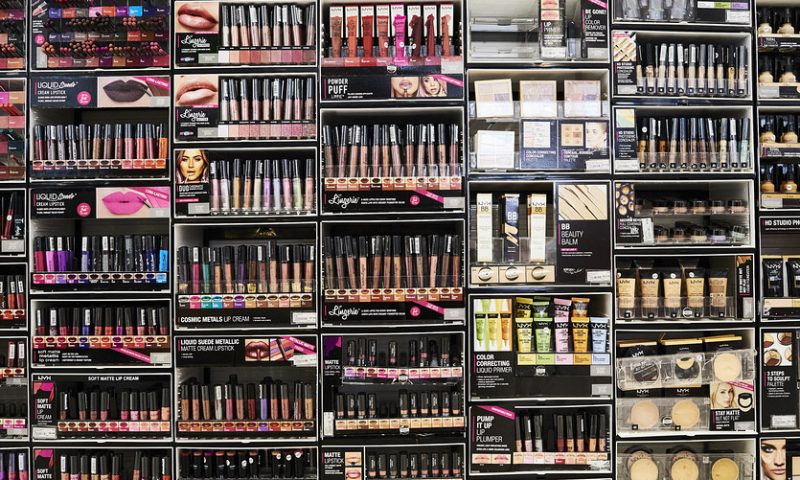Stock slides 29% and is on track for biggest ever one-day decline after warning that sales headwinds would dent earnings
Ulta Beauty Inc. shares slid 29% Friday, putting them on track for their biggest ever one-day percentage decline, after the beauty products retailer warned that sales headwinds would dent future earnings.
The move weighed on other cosmetics stocks with e.l.f. Beauty Inc. ELF, -2.57% down 4.3% and Estée Lauder Cos. Inc. EL, -2.76% down 2.4%.
Bolingbrook, Ill.-based Ulta ULTA, -29.55%, which was riding high earlier this year thanks to the boost it was enjoying from the cosmetics line launched by reality TV star Kylie Jenner,said it earned $161.3 million, or $2.76 a share, in the second quarter, compared with $148.3 million, or $2.46 a share, in the year-earlier period. Revenue rose 12% to $1.67 billion. Analysts polled by FactSet expected earnings of $2.80 a share on sales of $1.68 billion.
But it was the lowered guidance that really hammered the stock. Ulta lowered its same-store sales growth expectations to 4% to 6% for the year, from previous guidance of growth of 6% to 7%. It cut its per-share earnings forecast to $11.86 to $12.06 from a previous $12.83 to $13.03.
“We believe the industrywide challenges in the make-up category will continue in the near term, and as a result, we’ve adjusted our outlook for the rest of 2019 to reflect ongoing volatility in the category,” Chief Executive Mary Dillon told analysts on the company’s earnings call, according to a FactSet transcript.
The news triggered at least four downgrades as analysts cut estimates and slashed stock price targets. The average price target of analysts polled by FactSet fell to $307.17 early Friday from $376.56 at the end of July.
Morgan Stanley analyst Simeon Gutman downgraded the stock to equal weight from overweight, and trimmed his stock price target to $275 from $395. The quarter was a “thesis changing” one with the growth outlook for half the business — cosmetics — slowing meaningfully, Gutman wrote in a note to clients.
When Morgan Stanley upgraded the stock back in January of 2018, analysts were expecting several drivers to help it outperform, including that the business had an extra year of square footage growth as it built out its stores.
“We think these drivers have moderated while the distinermediation risk from digitally native brands seems higher,” Gutman wrote, “In our view, this limits upside for both Ulta’s multiple and earnings growth in the near term.”
Piper Jaffray downgraded the stock to neutral from overweight and cut its stock price target to $250 from $360. Analysts led by Erinn Murphy said they would rather remain on the sidelines during a period of “muted visibility.”
“What was concerning to us is that this weakness is not only in prestige (which has been the case for well over 18 months) but management called out masstige as having weakened quarter-to-date, following several quarters of double-digit growth,” said Murphy. “While the company has done an excellent job of bucking the general market trend through securing digitally native brands, we are concerned that the business trajectory has turned on a dime.”
At William Blair, analyst Daniel Hofkin said Ulta executives were unable to offer a convincing explanation for why things had slowed so dramatically in the last six weeks, and neither can he.
Management said cosmetics sales were hit by a lack of meaningful “newness and incrementality,” meaning any newness was not really resonating with consumers, and even when it did, it was not encouraging them to buy ancillary items such as make-up brushes.
“While this is certainly plausible, we struggle to understand why this trend would cause such a sudden step-down in the trajectory of the overall category, particularly given that material newness has been lacking in the cosmetics category for nearly two years (particularly relative to the preceding several years),” the analyst wrote in a note to clients.
Hofkin said he’s sticking with his outperform rating on the stock, however, because he continues to view the company as having a solid long-term growth story.
Stifel analysts led by Mark Astrachan cut their price target to $250 from $315, while JPMorgan’s Christopher Horvers lowered his to $317 from $395. Stifel is sticking with a hold rating, while JPMorgan remains overweight.
Cowen’s Oliver Chen said the cosmetics industry is in a softer cycle now that does not require a heightened level of units per transaction. The recent trends, such as contouring and brow styling that involved rituals and application techniques that were driving growth, have peaked.
Chen said he is sticking with his outperform rating based on the longer-term view given Ulta’s appeal to Generation Z and a data-centric model that includes more than 33 million loyalty members. However, “ULTA’s diversified portfolio across price points, categories, and newness, is not immune to underlying market dynamics, despite the fact that ULTA has effectively bucked slowing Prestige trends since mid-2017 through a series of ongoing brands launches and assortment expansions,” he wrote.
Cowen lowered its stock price target to $313 from $375.
Ulta shares are now down 2% in 2019, while the S&P 500 SPX, +0.06% has gained 17% and the Dow Jones Industrial Average DJIA, +0.16% has gained 13%.

